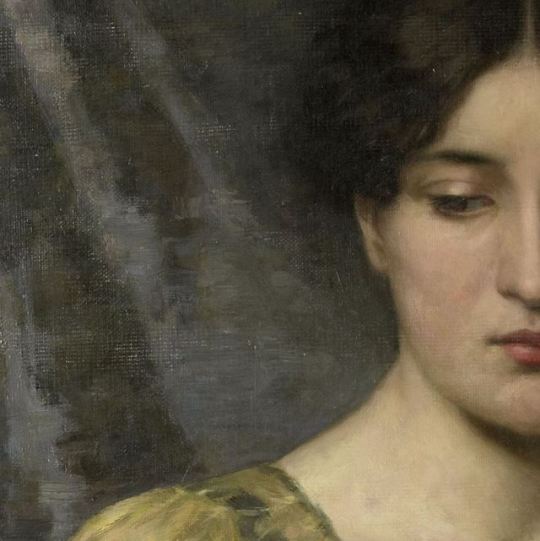Photo

Detalle de Judith decapitando a Holofernes. Caravaggio (1599)
27 notes
·
View notes
Photo

Portrait of a Woman (detail) by Marie Wandscheer, 1886.
737 notes
·
View notes
Audio
“I opened myself to the gentle indifference of the world.”
3K notes
·
View notes
Text
Rooms
By Charlotte Mews, 1869-1928
I remember rooms that have had their part
In the steady slowing down of the heart.
The room in Paris, the room at Geneva,
The little damp room with the seaweed smell,
And that ceaseless maddening sound of the tide—
Rooms where for good or for ill—things died.
But there is the room where we (two) lie dead,
Though every morning we seem to wake and might just as well seem to sleep again
As we shall somewhere in the other quieter, dustier bed
Out there in the sun—in the rain.
3 notes
·
View notes
Text
“Bright star, would I were stedfast as thou art”
By John Keats, 1795-1821
Bright star, would I were stedfast as thou art—
Not in lone splendour hung aloft the night
And watching, with eternal lids apart,
Like nature's patient, sleepless Eremite,
The moving waters at their priestlike task
Of pure ablution round earth's human shores,
Or gazing on the new soft-fallen mask
Of snow upon the mountains and the moors—
No—yet still stedfast, still unchangeable,
Pillow'd upon my fair love's ripening breast,
To feel for ever its soft fall and swell,
Awake for ever in a sweet unrest,
Still, still to hear her tender-taken breath,
And so live ever—or else swoon to death.
0 notes
Video
youtube
Frédéric Chopin’s Complete Nocturnes played by Brigitte Engerer
1. 0:06 Op. 9, No. 1 in B flat minor. Larghetto
2. 5:53 Op. 9, No. 2 in E flat major. Andante
3. 10:29 Op. 9, No. 3 in B major. Allegretto
4. 17:09 Op. 15, No. 1 in F major. Andante cantabile
5. 22:07 Op. 15, No. 2 in F sharp major. Larghetto
6. 25:43 Op. 15, No. 3 in G minor. Lento
7. 30:53 Op. 27, No. 1 in C sharp minor. Larghetto
8. 36:32 Op. 27, No. 2 in D flat major. Lento sostenuto
9. 42:27 Op. 32, No. 1 in B major. Andante sostenuto
10. 47:27 Op. 32, No. 2 in A flat major. Lento
11. 53:01 Op. 37, No. 1 in G minor. Lento
12. 59:51 Op. 37, No. 2 in G major. Andante
13. 1:06:17 Op. 48, No. 1 in C minor. Lento
14. 1:12:25 Op. 48, No. 2 in F sharp minor. Andantino
15. 1:20:11 Op. 55, No. 1 in F minor. Andante
16. 1:25:36 Op. 55, No. 2 in E flat major. Lento sostenuto
17. 1:31:19 Op. 62, No. 1 in B major. Andante
18. 1:38:51 Op. 62, No. 2 in E major. Lento
19. 1:45:11 Op. 72, No. 1 in E minor. Andante
20. 1:49:19 Op. posth in C sharp minor. Lento con gran espressione
21. 1:53:18 Op. posth in C minor. Andante sostenuto
⏤
Nocturne, (French: “Nocturnal”), in music, is a composition inspired by, or evocative of, the night, and cultivated in the 19th century primarily as a character piece for piano.
1 note
·
View note
Text
Sailing to Byzantium
by William Butler Yeats, 1865 - 1939
I
That is no country for old men. The young
In one another's arms, birds in the trees,
—Those dying generations—at their song,
The salmon-falls, the mackerel-crowded seas,
Fish, flesh, or fowl, commend all summer long
Whatever is begotten, born, and dies.
Caught in that sensual music all neglect
Monuments of unageing intellect.
II
An aged man is but a paltry thing,
A tattered coat upon a stick, unless
Soul clap its hands and sing, and louder sing
For every tatter in its mortal dress,
Nor is there singing school but studying
Monuments of its own magnificence;
And therefore I have sailed the seas and come
To the holy city of Byzantium.
III
O sages standing in God's holy fire
As in the gold mosaic of a wall,
Come from the holy fire, perne in a gyre,
And be the singing-masters of my soul.
Consume my heart away; sick with desire
And fastened to a dying animal
It knows not what it is; and gather me
Into the artifice of eternity.
IV
Once out of nature I shall never take
My bodily form from any natural thing,
But such a form as Grecian goldsmiths make
Of hammered gold and gold enamelling
To keep a drowsy Emperor awake;
Or set upon a golden bough to sing
To lords and ladies of Byzantium
Of what is past, or passing, or to come.
1 note
·
View note
Text
from, The Great Modern Poets
An anthology of the best poets and poetry since 1900. Edited by Michael Schmidt.
The reader who reads only for sense, rapidly running an eye across the lines without hearing the way the words work together, without getting the tongue, lips and teeth involved in the verse itself, will miss the poetry and probably the sense as well. This is because in poetry much of the sense and most of the pleasure reside in the sounds the poems make, the ways in which accented syllables balance with unaccented syllables, how the alliteration and assonance (the repetition and patterning of consonants, or of vowel sounds, within a line or over several lines) enact the sense, contribute to the tone; how the poem creates patterns of expectation through sound, and then plays variations, reversals, inversions.
Poems are wonderfully open, democratic spaces. They may ask us to read them several times before we understand the balances and contrasts, the lights and shadows, that they offer, but they are for the most part not deliberately obscure. If we read poems as prose, they have very little to say.
Prose uses the medium of language while poetry serves language and explores it.
1 note
·
View note
Video
youtube
Mischa Maisky plays Bach Cello Suite No.1 in G
1 note
·
View note